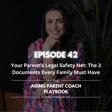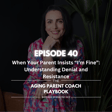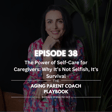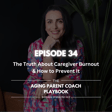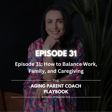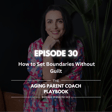
Episode 32: Estate Planning Basics for Caregivers
Welcome back to The Aging Parent Playbook. I’m Dr. Barbara Sparacino—and if you're caring for an aging parent, you already know that the practical side of caregiving can be just as emotional and overwhelming as the rest.
In this episode, I’m talking about something many families avoid—but absolutely need: estate planning.
I’ll walk you through:
✅ The three most important estate planning documents
✅ Why caregivers need a seat at the table
✅ How to start the conversation (without causing tension)
You’ll also learn about common mistakes families make—like outdated wills, hidden documents, and waiting too long to act—and how you can avoid them.
Planning ahead isn’t about being morbid. It’s about honoring your parent’s wishes and giving everyone peace of mind.
🎁 Need help getting started? Download the free Estate Planning Checklist for Caregivers at www.theagingparentcoach.com
